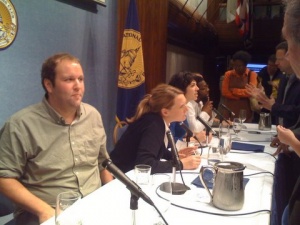April 15th, 2011 by Dr. Val Jones in Announcements, Quackery Exposed
10 Comments »
 A few days ago I published a blog post about Dr. Mehmet Oz NOT being a trustworthy source of health information. It set off a firestorm of blog comments, tweets, and Facebook sharing – all because people (like me) had developed sincere concerns about the safety of viewers who might take his advice to heart. The outpouring of commentary, and the rapidity of the response made me wonder: can we harness this power for future good? Could we counter Dr. Oz’s (and others like him) misinformation with peer-reviewed content that’s easily accessible by Twitter and Facebook?
A few days ago I published a blog post about Dr. Mehmet Oz NOT being a trustworthy source of health information. It set off a firestorm of blog comments, tweets, and Facebook sharing – all because people (like me) had developed sincere concerns about the safety of viewers who might take his advice to heart. The outpouring of commentary, and the rapidity of the response made me wonder: can we harness this power for future good? Could we counter Dr. Oz’s (and others like him) misinformation with peer-reviewed content that’s easily accessible by Twitter and Facebook?
I chatted with some colleagues and concerned patient advocates on Twitter (including @academicobgyn @scanman @hrana @AmberMBaylor @DamonRamseyMD @RyanMadanickMD @jalbietz @DrElizabethLee @FaceliftMD @goodwillstacy @PWestcott ), and we all agreed that it would be a great service to have vetted health tweets available for people to read and retweet. If enough of us were regularly engaged in retweeting sound health stories and information, we could potentially drown out the “miracle cures” and snake oil that drives us all nuts.
So how would this work?
I’d like to get a small group of volunteer experts together – healthcare professionals committed to science and common sense – and have them read and approve links before they are promoted on Twitter. I have created a new Twitter account called “HealthyRT” – the volunteer experts will have access to this account and can promote content that is medically sound. I hope that the word will be spread about this account, and people will subscribe to the feed and RT links that they find helpful. In this way, everyone on Twitter has the power to RT good health content, and it takes very little effort for retweeters to be engaged.
Now, there is no guarantee that the feed will be perfect (no peer-review process is) but every effort will be made to ensure that it is not used for self-promotion or that the standards lapse over time. If there are any concerns, people can direct message the HealthyRT team and we’ll keep us on the straight and narrow with the help of the crowd (as it were).
This experiment could fail or peter out… or it may become the greatest anti-snake oil strategy in Internet history. It all depends on the commitment of the reviewers and the extent of our subscriber base. But I’m willing to give it a try… and I hope you are too!
Anyone interested in becoming a HealthyRT reviewer, please email me directly: val-dot-jones at getbetterhealth.com.
Everyone who’d like to help to promote good health content – and drown out the bad – please subscribe to HealthyRT and retweet it as much as possible.
Please use the comments section here if you have ideas about how to improve this strategy. Let’s do it!
*You can follow us now at: http://twitter.com/#!/HealthyRT *
August 26th, 2010 by Steve Novella, M.D. in Better Health Network, Health Policy, News, Opinion, Research
No Comments »

Peer review has been the cornerstone of quality control in academia, including science and medicine, for the past century. The process is slow and laborious, but a necessary filter in order to maintain a certain standard within the literature. Yet more and more scholars are recognizing the speed, immediacy, and openness of the Internet as a tool for exchanging ideas and information, and this is causing some to question the methods of peer review. A recent New York Times article discusses this issue.
This issue is very relevant to Science-Based Medicine (SBM) as this is in part an experiment –- an attempt to produce a high quality, editorially filtered, but not peer-reviewed, online journal. Our process here is simple. Outside submissions are reviewed by two or more editors and typically are either accepted with minor revisions or rejected. In addition we have a staff of regular contributors –- those who have a proven track record of producing high quality articles. There is no pre-publication review for their submissions, and they are able to post directly to SBM. Read more »
*This blog post was originally published at Science-Based Medicine*
October 18th, 2008 by Dr. Val Jones in Announcements, Humor
1 Comment »
I have been a fan of The Onion for many years. Its authors have mastered the art of news satire, and although they’re often irreverent, they’re equal opportunity lampooners. I always wondered what The Onion’s writers were like in person, and yesterday my wish to know them better came true at the National Press Club.
The writers are “20-30 somethings” with a wicked sense of humor and a healthy dose of self-confidence. They describe themselves as “schlubs” who have many “schlubby” friends. Most got their start working as reporters for small, midwestern newspapers. They dress casually and claim to be paid very little.
Of course, I bounced up to the panel as soon as the event was over and congratulated them on their science reporting and asked them to reveal to me who wrote the spoof article on medical peer review. It’s one of my favorite Onion articles of all-time, as it follows the science paper of a 5th grader (he wrote it about otters) as it undergoes peer scrutiny, shredding and denial for publication. You can read the article here.
Sadly, the panel members denied any memory of the otter article. I countered with my appreciation for their video news “Most Children Strongly Opposed To Children’s Healthcare” and they nodded politely. One writer asked me if I thought their scientific spoof articles were on-target, or if they betrayed their major lack of understanding of science in the first place.
“Well, as you writers well know,” I said, “‘science is hard.’ But you seem to be getting the right messages across. The medical community needs more reports like ‘Fifth Grade Science Paper Doesn’t Stand Up To Peer Review.’ There’s not much to laugh about in healthcare these days.”
I snapped a few photos of the mysterious authors for my fellow Onion fans. Do you have a favorite Onion article or headline?
P.S. When asked why the paper was called The Onion, one of the panelists said that the first team of writers were so poor they ate onion sandwiches to survive (eww), so they named the paper after their food of choice. The company currently employs about 30 people (20 for video production and 10 newspaper writers). Fortunately those present at the event did not seem to have onion breath.

Onion Breath Test
 A few days ago I published a blog post about Dr. Mehmet Oz NOT being a trustworthy source of health information. It set off a firestorm of blog comments, tweets, and Facebook sharing – all because people (like me) had developed sincere concerns about the safety of viewers who might take his advice to heart. The outpouring of commentary, and the rapidity of the response made me wonder: can we harness this power for future good? Could we counter Dr. Oz’s (and others like him) misinformation with peer-reviewed content that’s easily accessible by Twitter and Facebook?
A few days ago I published a blog post about Dr. Mehmet Oz NOT being a trustworthy source of health information. It set off a firestorm of blog comments, tweets, and Facebook sharing – all because people (like me) had developed sincere concerns about the safety of viewers who might take his advice to heart. The outpouring of commentary, and the rapidity of the response made me wonder: can we harness this power for future good? Could we counter Dr. Oz’s (and others like him) misinformation with peer-reviewed content that’s easily accessible by Twitter and Facebook?












